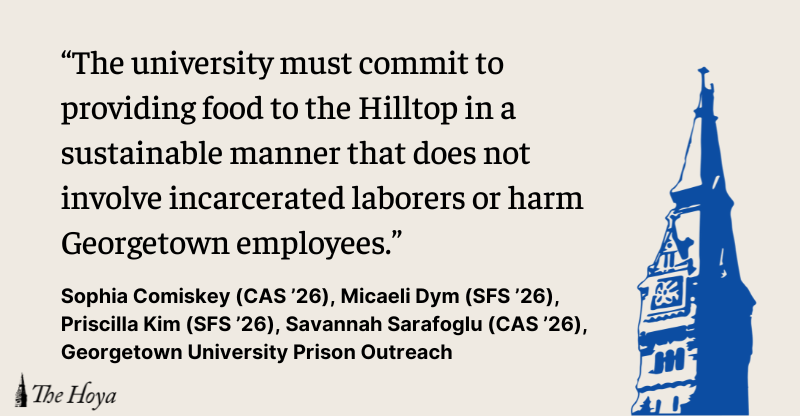Aramark, the food service and facilities provider contracted by Georgetown University, is guilty of sustaining unpaid prison labor, substandard working conditions and hazardous food quality. Aramark supplies the food and workers for Leo J. O’Donovan Dining Hall and Epicurean & Co. With operations in 19 countries, Aramark’s 2022 revenue was $16.3 billion, approximately 12% of which stems from prison labor.
Aramark not only uses the forced labor of incarcerated individuals for revenue but does so under the guise of providing rehabilitation services. Over 6,000 incarcerated individuals have worked in prison kitchens via the company’s In2Work program, often laboring up to 40 hours a week. Aramark classifies these individuals as “students” rather than employees — making them ineligible for adequate pay — while Aramark continues to profit off of their free labor.
Due to Aramark’s record on workers’ rights and prison labor, Georgetown must end its contract with Aramark and replace it with a self-operated dining service.
Inmates at the Santa Rita Jail in Alameda County, Calif., sued the county and Aramark in 2019 for involuntary servitude. The plaintiffs in the case prepared more than 16,000 meals a day without pay, and Alameda County Sheriff’s deputies allegedly threatened them with longer sentences and solitary confinement for noncompliance.
Aramark also has an abysmal track record of substandard food quality within prisons. On multiple occasions, incarcerated people have accused Aramark of severe health and safety violations, sanitation infractions and unauthorized food substitutions and reductions. Within the Santa Rita Jail, Aramark served food that was expired, spoiled and contaminated with rodent, insect and bird droppings. Aramark locations in Michigan, Ohio and Kentucky have recorded similar experiences.
In 2016, Georgetown signed a 10-year contract with Aramark, which maintained the corporation’s position as the university’s dining contractor. Aramark, rather than the university, employs all dining hall workers. During the contract negotiation process, students advocated to ensure that the employment status of all workers would be protected under Georgetown’s Just Employment Policy.
However, because Georgetown’s food service workers are contracted by Aramark, their rights are not protected by the university. These workers do not receive the benefits afforded to official university employees, such as fair wages, healthcare and adequate paid time off. In addition, Aramark’s food service workers have struggled with adequate staffing and training.
As Aramark employees explained at the recent Community Conversation on Workers’ Justice hosted by the Georgetown Coalition for Workers’ Rights, 2023 is a contract year during which workers can renegotiate their contracts. Consequently, Georgetown’s unionized workers can collectively bargain for more equitable treatment in the next pay cycle.
Nevertheless, Aramark employees — who are not unionized Georgetown workers — are not afforded these same benefits. As long as Georgetown continues to contract labor through Aramark, dining hall workers will not be granted the same employee rights as provided in Georgetown’s Just Employment Policy. This, combined with the corporation’s unjust and unsafe labor practices in private prisons, provides further reason for the university to cut all ties with businesses that contribute to the prison-industrial complex.
Severing the university’s ties to Aramark would mean contracting employees directly through Georgetown. The university would thus hold greater accountability in its treatment of dining workers and be bound to the terms of its Just Employment Policy. Therefore, employees would have access to more equitable benefits and safe conditions. Under the assurance that all dining staff would maintain their jobs, a private contract with the university would be an important step towards workers’ justice on campus.
Georgetown University Prison Outreach (GUPO) calls for the dissolution of the contract between Georgetown University and Aramark and for a self-operated dining system in partnership with Georgetown to take its place. With the contract between Georgetown and Aramark set to expire in 2026, now is the perfect time to begin exploring alternative dining systems.
GUPO is not alone in its efforts to sever ties with Aramark. In 2019, a group of student activists at Barnard College succeeded in preventing the renewal of a contract with Aramark.
GUPO would like Georgetown to turn to a self-operated service for future dining systems. Although such a system may sound expensive and difficult to implement, self-run dining services have become practical in the status quo. In 2022, Johns Hopkins adopted a self-operated dining service, providing a model for Georgetown to follow.
Adopting a self-operated dining service would further enable Georgetown to improve its sustainability efforts, as the university would be able to control where food is sourced and purchase from local, ethical vendors.
GUPO also urges Georgetown, in the event of a shift to a self-operated dining service, to follow in the footsteps of institutions like Johns Hopkins and retain the current dining staff as employees. Although this decision may increase short-term costs for Georgetown, its effects will pay dividends: working conditions will improve, Georgetown’s ties to the prison-industrial complex will be severed and its ecological footprint will shrink.
The university must commit to providing food to the Hilltop in a sustainable manner that does not involve incarcerated labor or harm Georgetown employees.
Priscilla Kim is a first-year student in the School of Foreign Service. Savannah Sarafoglu is a first-year student in the College of Arts & Sciences. Sophia Comiskey is a first-year student in the College of Arts & Sciences. Micaeli Dym is a first-year student in the School of Foreign Service. The authors are writers from the On-Campus Publications Team of Georgetown University Prison Outreach (GUPO).














